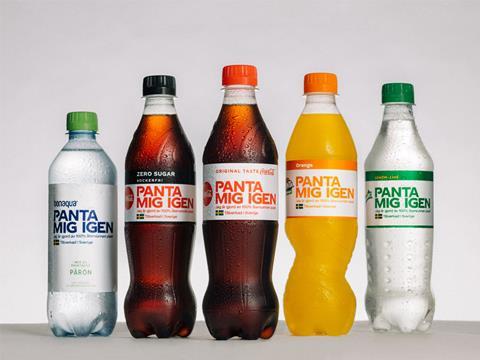
With Coca-Cola set to roll out its range of rPET bottles in Sweden, the company has unveiled new labels to deliver a message about recycling.
Coca-Cola Sweden’s new labels will be introduced across the Coca-Cola, Fanta, Sprite and Bonaqua brands and represent a radical departure from its standard international label design. This move marks the kick-off of the company’s sustainability initiative to encourage consumers to recycle, in the hopes of helping it to create a circular economy for its plastic packaging.
The labels of the bottles are not made of 100% recycled material, although they are recyclable and can be “easily” detached from the bottle in the recycling plant. According to Coca-Cola, “all fractions are recycled and have an onward market.”
From 2020, Coca-Cola will make all of its locally-produced bottles in Sweden from 100% recycled plastic, making it the first country in the world for Coca-Cola brands to do so.
The labels on the PET-bottles of Coca-Cola, Fanta, Sprite, and Bonaqua will become white, transformed from their signature colours to more clearly communicate the message: “Recycle me again. I am made of 100% recycled plastic. Made in Sweden.” The exclusive label design is on all PET bottles in size 0,5 L and 1.5 L which are locally produced in Jordbro.
Barbara Tönz, General Manager at Coca-Cola AB said: “The transition to 100% recycled plastics in Sweden affects 205 million bottles per year and is a significant landmark for our business. We are delighted to bring these new bottles, which use no new ‘virgin’ oil-based plastic, on to the market. Of course, we also want to ensure that we get each of these bottles back to recycle them again so that no material is ending up as litter or waste. That’s why I feel proud that we are launching the bottles with labels that mark such a distinctive departure from their usual look, using the power and reach of our brands to promote this important message.”
Tönz continued: “As a company, we are clear about our responsibility to see that none of our packaging ends up as waste or in the environment, and we need the support of consumers to achieve this. We are committed to making a positive contribution to the communities where we operate and to promoting a circular economy for plastic. When we engage with consumers on the issues that matter, we can really make a difference together.”













